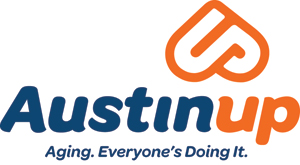
AustinUP Board member and business member John Brown, Owner, Oasis Senior Advisors, offers timely advice for families navigating elder care options during this pandemic.
Many families who have loved ones in a medical facility or other type of senior community are currently struggling with the new guidelines on visitations.
We have had many calls from families who do not understand their options or how to cope with these tough times. The coronavirus (COVID-19) and the emergency actions at all government levels triggered multiple restrictions on all types of senior living. As the federal government declared an emergency that triggered restricted visits, local counties and cities also declared emergencies that restricted visits even more.
All of us involved in the senior industry are working to support families and do what is best for our seniors, since they are in fact the most critical patients in this pandemic. We have to protect them at all costs; but at the same time, the social isolation these strict policies are creating are causing much unrest for the families – and the seniors.
Another concern about the current restrictions: Hospitals could get backed up as the discharge process gets bogged down with seniors who still need care but are fearful of the options out in the community. This will cause even more strain on the limited availability of hospital beds. More coming in and fewer leaving or extending the length of stay as they navigate these confusing times will burden the system even more than we think.
Preparation is important. Possible options when moving your loved one from a hospital, rehab or other community setting:
- Home with support. Bringing in durable medical equipment with caregiver support is an option as long as you bring in enough care. Often, due to costs or schedule restraints, families will bring in minimal care to help the senior. Planning is critical to have enough help at the right times to prevent a sudden re-admission. If your loved is going home, heed the advice of the medical team and the care team. If they feel your loved one needs care with activities of daily living, make sure you have family members or scheduled caregivers in place to cover all of the necessary activities. If the senior needs help with transferring or incontinence, that will usually cause the care needs to be 24/7.
- Senior living communities (all types). Depending on their size, many facilities are on lockdown to visitors, but are still accepting new patients and residents. Touring is more difficult due to visit restrictions, but we are using many different tools to accommodate, e.g., FaceTime, video tours and off-premise meetings. The larger the community, the harder it is to find the right space. But the situation is evolving. Over the past few days, smaller communities have begun to allow controlled visits and some communities are starting to test for COVID-19 on admission.
- Skilled nursing. Skilled nursing facilities are under the strongest restrictions at this time. Visiting patients is not allowed under any circumstances. These patients often have the highest care needs and are the most vulnerable.
- Respite care. This involves a short-term stay in either a community or a facility until the isolation period ends.
There are many ways to navigate this process and I would consider talking to a local advisor or care coordinator. There are solutions out there to help families. Your local advisors are knowledgeable and are in constant contact with industry professionals who have the most up-to-date information and solutions to fit each family’s unique situation.
One final note about how to stay in contact with your senior if they are in a facility or community currently on lockdown. You can write letters, send videos, FaceTime and in some cases, visit from a distance through a window. I know this is hard, but many communities are scrambling to bring in tablets and devices to facilitate chats with families. They’re trying to make the communication a little easier during this difficult time.
For those who don’t have a family member in a facility but still want to help, many groups are encouraging families to spend family time at home writing simple letters, drawing and coloring pages to send to seniors. Here in Austin, I invite you to send your cards and letters to Oasis Senior Advisors Austin (152 Sandstone Trail, Buda, Texas 78610), and we will deliver them to the facilities to share with residents.
By working together during this pandemic, we can help vulnerable seniors get the care they need.
